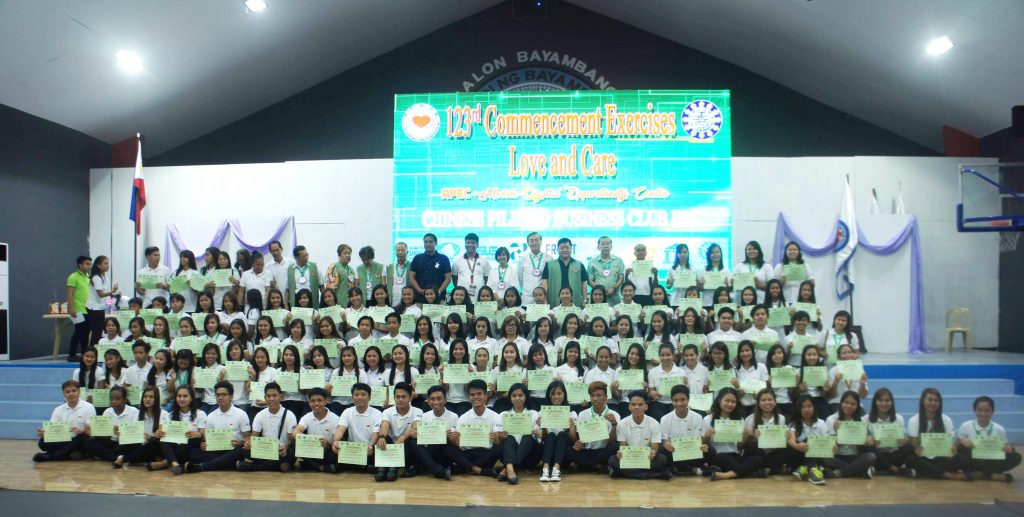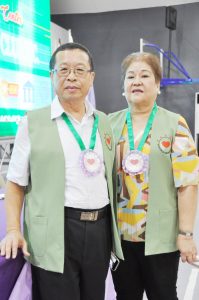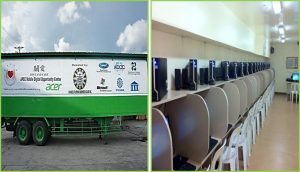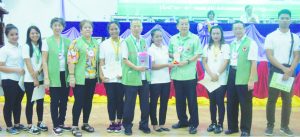
Though technology today is a boon to society, it is also one of the main causes of the widening gap between the older and younger generations in the Philippines. While the more tech savvy youth embraces the newer and faster technology, it leaves most of the older generation feeling left behind and daunted.
Information and Communications Technology (ICT) not only widens the gap between a typical mom and her daughter, it also widens the gap between socio-economic classes. And it can become a vicious cycle.
With companies and businesses relying ever more on technology, a hardworking fresh graduate from a college in a smaller community has little chance of getting hired, as the college simply does not have the resources: qualified teachers, funding and equipment to teach the proper skills in ICT to help its students compete in the labor market.
This is where the steadfast vision of the Huangs comes in.

In 2012, Billy and Bella Huang, a humble husband-and-wife tandem, established the Fil-Chi Love and Care Foundation (FCLCF) to provide both digital and values learning through ICT education. Their goal was to direct ICT education where it was most needed: the rural areas.
After the successful reception of their first training center in Manila, several companies and organizations partnered with FCLCF. Asia-Pacific Economic Cooperation, ACER Philippines, ASUS Philippines, TESDA, the Chinese Filipino Business Club, Rotary Club of Manila Metro District 3810, Adamson University Alumnae Association, Inc., among others, joined together to create the APEC Mobile Digital Opportunity Center (AMDOC).
A 40-foot container van was converted into a mobile computer classroom, providing free basic computer education, computer hardware maintenance and troubleshooting. The mobile van goes to communities in need of ICT education. Target recipients of this training program are out-of-school youth, secondary and college students, housewives, government employees, and even the elderly. Anyone between the ages of 8 to 80, as long as they display the capacity and willingness to undergo the skills training, is allowed to register.
At present, there are six mobile computer classrooms located in different parts of the country, from Isabela to Negros Occidental.
Upon arrival, the mobile van stays in location for nine weeks. It hits the ground running, starting a series of three-week courses in a classroom that accommodates 20 students.
Five class schedules are offered per day, so students are able to choose a time to fit their own personal schedule. The earliest class starts at 7:30 a.m. and lasts for two and a half hours. The last session ends at 8 p.m. In areas where the demand is high, classes are even offered from 8:30 p.m. to 10 p.m., a testament to the teachers’ dedication and students’ perseverance.
At the end of nine weeks, about 300 graduates attend closing ceremonies. Students with incomplete attendance do not receive a certificate. To date, AMDOC have about 35,000 graduates.
Apart from the mobile container vans, FCLCF also has the Mobile Laptop Training, where laptops are transported to remote areas inaccessible by large container vans. The very first recipients of this laptop training are the people of Casiguran, Aurora.
Aside from teaching computer skills, this program also incorporates values formation.
Bella, who is from San Miguel, Bulacan, recounted how she and Billy wanted a program that would not just teach basic computer skills, but develop character as well.
The values formation class that is merged together with the training program is their way of demonstrating that intelligence plus character is the goal of true education.
In her speech of gratitude delivered during the 123rd Commencement rites of FCLCF last May 9 at Bayambang, Pangasinan, Aida L. Valdez shared that she not only learned ICT in the mobile computer classroom, but formed new friendships with co-students who she refers to as her “family.”
She added that the skills she learned will help her land better and higher-paying jobs in the future.
Nineteen-year-old Gleneer John Agamao, BA English student of Bayambang State University, is another grateful graduate.

Despite a challenging schedule – he had to enroll in the last session because of school, and after the computer class, which ends at 8 p.m., he faces another hour of travel time to reach home – he did not give up. He attended all the sessions because he believes the skills that he learns from this training will help him in the future.
Pearlene Joy Surait, an 18-year old Senior High School graduate, recalled her parents could not afford to send her to college and told her to look for a job. The skills she acquired in the training program would help build her resume for job hunting.
In addition, the values formation class also served as a venue for them to encourage each other despite challenges in life.
“Akala ko ako lang ang may mabigat na problema,” she said, “nagkaroon ako ng mga kaibigan dito kung saan pwede ko i-open ang mga problema ko.”
Several senior citizens have also enrolled in the program to help themselves become more productive or simply improve their ability to function in today’s world.
Imelda Mendoza, a 71-year old grandmother, does the records for the Retirees Association in Microsoft Excel. Mendoza said she is no longer scared of computers because she now knows how to make them work. She added that her new found knowledge has enabled her to connect with her grandson through Facebook.
Sixty-eight-year-old Eligio Veloria enrolled because he is the current secretary of the Office of Senior Citizen Affairs in their municipality.
Knowing about computers helps him do his work efficiently. “Marami akong natutunan. Hindi pa ako expert, pero yung natutunan ko, pinapraktis ko para mas masanay ako. I am very thankful that at my age, I was given a chance to study computers for free.”

When Edujives Catindig, 69, president of the Seniors Association in their barangay, heard that a mobile computer classroom was in the area, she immediately signed up with her friend Felicidad Aurellano, 70. Both women said the teacher paid more attention to them because they had zero computer background.
Edgar Allen Laddaran and his assistant teacher Marlon were former students in the mobile classroom. They give back by becoming teachers themselves.
Laddaran is a graduate of BS Secondary Education and is a licensed teacher. He has been teaching for a year and found fulfillment in teaching. He likes being a FCLCF teacher because he feels appreciated by his students. He observes that students of 40 years old and above tend to be more appreciative than the millennials.
Marlon became a teacher so that he wouldn’t have to ask money from his parents. He is currently an undergraduate of AB English, and wants to finish his studies after he has saved enough money.
The stories go on. It just shows how ICT education can actually transform the lives of people.
The gratitude of so many people whose lives were made better with the AMDOC project has made founder Billy Huang even more motivated to work harder and help more Filipinos.
Born in Taiwan, Billy came to the Philippines in 1976 when he was 22 years old and worked as a technician making engine value for vehicles. He became a successful businessman and in 2003, he began his tireless efforts of helping Filipinos through the various foundations he has established as his way of giving back to the country that has helped him achieve success.
His connections with the Taiwan government also played a key role in his projects. As Taiwan is a member of Asia Pacific Economic Council, the government decided to help FCLCF provide free basic computer literacy education to Filipinos who cannot afford an expensive computer education.
For the graduates of AMDOC, Bella has this to say: “Ang challenge ko sa inyo ay kung paano ninyo gagamitin yung ibinigay namin sa inyo na edukasyon para makatulong sa iba.”
By working together, Billy and Bella want to encourage the graduates to be beacons of hope for the others. After all, FCLCF’s mission is not just to teach, but to touch lives as well.





